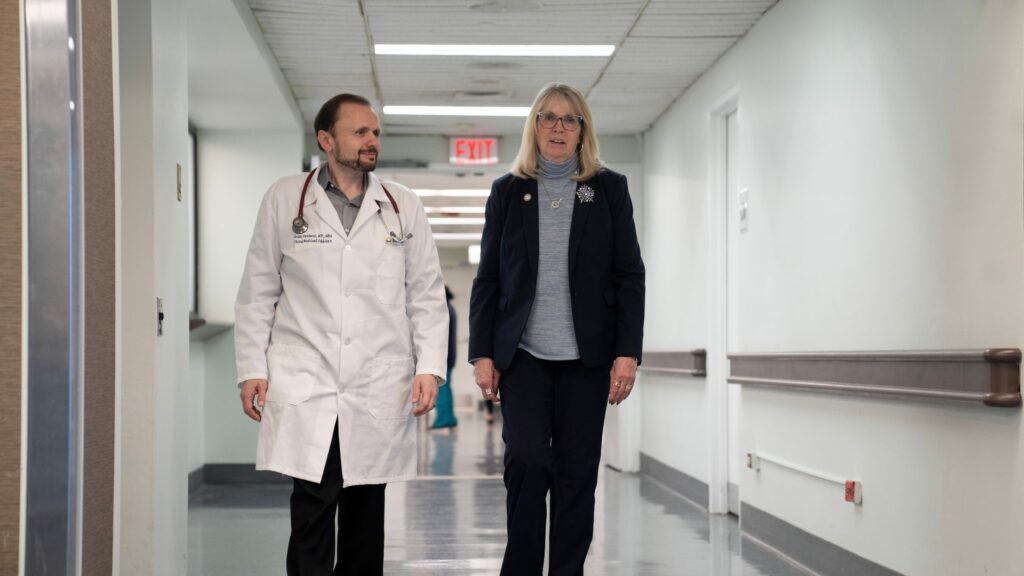2-minute read
Long COVID patient in NJ faces stigma and lingering symptoms
Barbara Piascik, an executive at Bergen New Bridge Medical Center, has Long COVID. She has been advised by the hospital’s chief medical officer.
COVID-19 cases and hospitalizations have risen steadily since June in New Jersey, outpacing last summer’s numbers and reflecting a nationwide trend, state data shows.
But serious cases remain low in the state despite the increase in transmission. The number of COVID patients on ventilators has barely risen out of the single digits each day for much of the summer.
COVID numbers have been on the rise across the U.S., a trend that even saw President Joe Biden become infected in July. The numbers in New Jersey and nationally are still far below the annual peak in late December and early January each year, when transmission is greatest due to holiday travel and more time spent indoors together.
Story continues below photo gallery
While experts thought COVID would behave as a seasonal virus such as influenza and RSV, that may no longer be the case, said Dr. Stanley Weiss, an infectious disease specialist at Rutgers New Jersey Medical School. The emergence of new variants — such as the KP.3.1.1 subvariant — where a strain of COVID mutates into a slightly different form, can cause transmission to increase regardless of the time of year.
“Our crystal balls have been very poor and part of that has been the rapid evolution of COVID variants,” Weiss said. “They have been very unpredictable.”
In New Jersey, there hasn’t been one dominant strain of COVID propelling the numbers this summer. As of late July, there were at least 12 subvariants of the Omicron strain circulating in New Jersey with one, LB.1, accounting for about 28% of cases, state Health Department data shows.
NJ COVID cases rose from 165 to 509
Another reason for the increase could be the weather. Despite some cooler temperatures this week, New Jersey is on pace to have one of its warmest summers on record. Heat and humidity usually forces people to seek air conditioner relief indoors where viral transmission is greater.
Whatever the case, COVID hospitalizations in New Jersey were at 165 on June 1 and steadily rose throughout the summer to 509 as of Monday.
That’s still far below the peak in daily COVID hospitalizations in New Jersey during the start of the pandemic, when more than 6,200 were hospitalized in April 2020, or during the Omicron spike, when nearly 6,100 were hospitalized in January 2021.
The number of new cases in New Jersey this summer rose to 2,910 as of Aug. 3 — about 1,100 more than at the same time last year. The number is likely far greater since the 2,910 count only includes those who tested positive with a PCR lab test, not a rapid home test.
Despite the rise, most cases are not serious. The number of COVID patients in intensive care statewide was 48 on Tuesday, about double the amount from early June. COVID patients on ventilators has remained constant. There were 11 as of Tuesday.
Although increasing rates in the summer could be a warning of an even worse fall and winter, updated vaccines from Pfizer, Moderna and Novavax will be available as soon as September to provide protection from the new variants.
The CDC recommends everyone ages 6 months and older, with some exceptions, to receive an updated 2024-2025 COVID-19 vaccine to protect against the disease, regardless of whether or not you have previously been vaccinated against the virus.
“The good news is these vaccines will offer better protection against the acquisition of COVID,” Weiss said. “That could make a big difference in lowering transmission.”
This article contains information from USA Today.
Source link : http://www.bing.com/news/apiclick.aspx?ref=FexRss&aid=&tid=66bcc234ee45494892bcf7498e26ca51&url=https%3A%2F%2Fwww.usatoday.com%2Fstory%2Fnews%2Fhealth%2F2024%2F08%2F08%2Fcovid-spreading-faster-summer-2024-nj-why%2F74702918007%2F&c=14119620707492104112&mkt=en-us
Author :
Publish date : 2024-08-07 21:22:00
Copyright for syndicated content belongs to the linked Source.
